U.S. now ranked as a "flawed democracy" By The Wayne Madsen Report
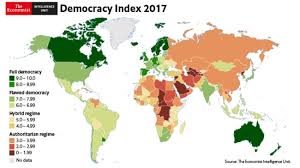 Thanks to the actions of the Trump administration, the United States fared even worse in the Index for 2017. The United States is still ranked as a "flawed democracy," but the actions of Trump to circumvent the powers of the legislative and judicial branches, as well as curtail the independence of the Justice Department and Federal Bureau of Investigation, have placed the nation at risk of dropping further in the annual index for 2018 to a "hybrid regime." The Economist Intelligence Unit, which calculates the annual Democracy Index, rates nations as falling into four categories: full democracy, flawed democracy, hybrid regime, and authoritarian regime.
Thanks to the actions of the Trump administration, the United States fared even worse in the Index for 2017. The United States is still ranked as a "flawed democracy," but the actions of Trump to circumvent the powers of the legislative and judicial branches, as well as curtail the independence of the Justice Department and Federal Bureau of Investigation, have placed the nation at risk of dropping further in the annual index for 2018 to a "hybrid regime." The Economist Intelligence Unit, which calculates the annual Democracy Index, rates nations as falling into four categories: full democracy, flawed democracy, hybrid regime, and authoritarian regime.
The top five full democracies for recent years have included Norway, Iceland, Sweden, New Zealand, and Denmark. Norway finished at the top of the Democracy Index for 2017. For 2017, the United States was tied with Italy and ranked just behind South Korea and just ahead of Japan.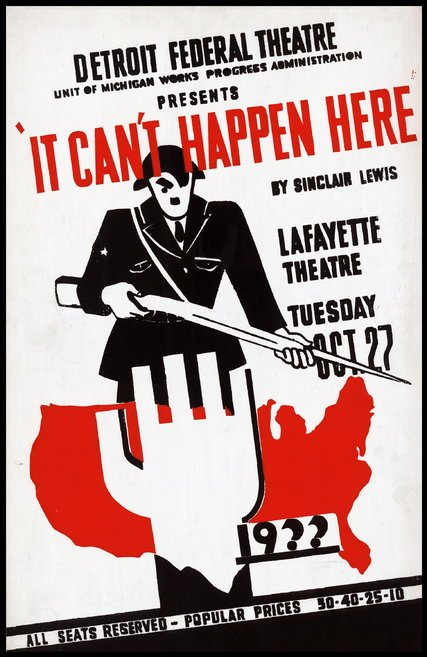

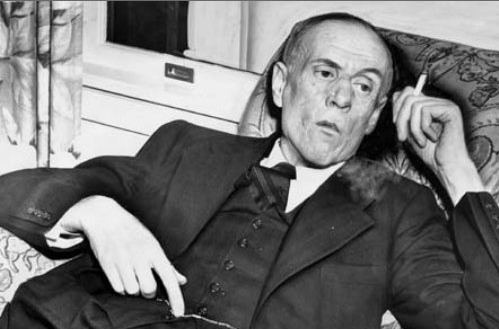 The writer Sinclair Lewis, author of Elmer Gantry and Main Street, [pictured, left] could have had someone like Donald Trump in mind when, in 1935, he published his best-selling novel It Can't Happen Here. In 1936, the novel was adapted into a play with the same title. The novel's chief protagonist is journalist Doremus Jessup, a reporter for the Fort Beulah, Vermont Daily Informer, an old-school liberal newspaper. Jessup helps lead the opposition to an authoritarian "populist" president named Berzelius "Buzz" Windrip.
The writer Sinclair Lewis, author of Elmer Gantry and Main Street, [pictured, left] could have had someone like Donald Trump in mind when, in 1935, he published his best-selling novel It Can't Happen Here. In 1936, the novel was adapted into a play with the same title. The novel's chief protagonist is journalist Doremus Jessup, a reporter for the Fort Beulah, Vermont Daily Informer, an old-school liberal newspaper. Jessup helps lead the opposition to an authoritarian "populist" president named Berzelius "Buzz" Windrip.
In the 1936 election, Windrip defeats President Franklin D. Roosevelt at the Democratic National Convention, whereupon the incumbent president organizes the Jeffersonian Party to take on Windrip in the general election. Windrip goes on to defeat both Roosevelt and the fictional Republican candidate, Senator Walt Trowbridge, in the November election. Windrip, a firebrand populist, wins office on a platform of restricting immigration, attacking the poor, and threatening to curtail the "liberal" press. Windrip manages to get America's religious right to support him after he receives the full backing of a firebrand Indiana fundamentalist radio preacher named Bishop Prang.
After Trump's upset win over Hillary Clinton in 2016, Money magazine reported that sales of Lewis's novel spiked.
Soon after assuming office, Windrip proceeds to ban dissent. He trains a paramilitary force called the Minute Men to arrest his enemies and throw them into concentration camps. In his first State of the Union address, Trump announced he w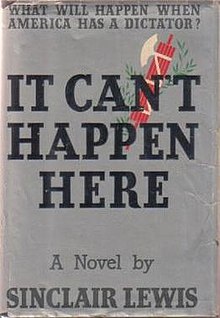 as keeping open the detention center in Guantanamo Bay, Cuba, a U.S. military enclave that exists in a legal "no man's land" outside the constraints imposed by the U.S. Constitution.
as keeping open the detention center in Guantanamo Bay, Cuba, a U.S. military enclave that exists in a legal "no man's land" outside the constraints imposed by the U.S. Constitution.
 as keeping open the detention center in Guantanamo Bay, Cuba, a U.S. military enclave that exists in a legal "no man's land" outside the constraints imposed by the U.S. Constitution.
as keeping open the detention center in Guantanamo Bay, Cuba, a U.S. military enclave that exists in a legal "no man's land" outside the constraints imposed by the U.S. Constitution.
One of Windrip's initial actions is to limit the power of the U.S. Congress. Windrip replaces Congress with a "Corpo" government that eliminates rights for women and minorities. The president also abolishes states by replacing them with administrative sections. Military tribunals take the place of civilian courts.
In reaction, Jessup joins the New Underground, led by Senator Trowbridge, to spirit dissidents out of the United States to political asylum in Canada. Jessup forms a new paper, called the Vermont Vigilance, to fight against Windrip's corporate fascist government.
After Windrip fails to deliver to his ardent supporters the improvement he promised to lift them out of the Great Depression, opposition to his presidency increases. After Windrip orders the arrest of his running mate, Vice President Perley Beecroft, for insubordination, the Veep flees the country. Windrip is eventually ousted in a coup led by his Secretary of State, chief propagandist, and one-time campaign adviser, Lee Sarason, as well as his top military adviser, General Dewey Haik. Windrip then flees to France.
Upset with Sarason's presidency, Haik leads a military revolt that commandeers the White House and kills Sarason and his top aides. Haik then orders a U.S. military invasion of Mexico. Lewis's novel ends as a civil war breaks out across the United States, with Jessup working as a spy for the New Underground in Corpo-ruled parts of southern Minnesota.
It Can't Happen Here was slated to become a 1936 film starring Lionel Barrymore; Basil Rathbone; radio's "Charlie Chan," Walter Connolly; and Virginia Bruce -- the co-star of 1936's The Great Ziegfeld. However, Metro-Goldwyn-Mayer chief Louis B. Mayer axed the production after complaints were received from Nazi Germany, via the Production Code Administration in Washington, DC about the film's unsuitability for the German market.
In 1968, the film project was dusted off for the small screen in a TV mini-series with the working title of Shadow on 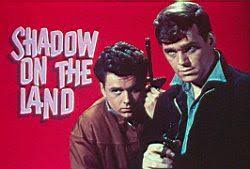 the Land, starring Jackie Cooper, John Forsythe, and Gene Hackman, and Carol Lynley. Also titled, United States: It Can't Happen Here, the series pilot was aired as a made-for-television movie but the rest of the series' production run was canceled. As with the 1936 movie, there was reason to believe that right-wing elements in the United States -- including FBI director J. Edgar Hoover -- objected to the "anti-fascism" nature of the production. In 1982, a TV series based on Lewis's novel, titled Storm Warnings, was presented to NBC, which rejected the premise of a fascist takeover of the United States. NBC only bought off on the series after American fascists were recast as human-consuming reptilian extraterrestrials and the name of the series was changed to V.
the Land, starring Jackie Cooper, John Forsythe, and Gene Hackman, and Carol Lynley. Also titled, United States: It Can't Happen Here, the series pilot was aired as a made-for-television movie but the rest of the series' production run was canceled. As with the 1936 movie, there was reason to believe that right-wing elements in the United States -- including FBI director J. Edgar Hoover -- objected to the "anti-fascism" nature of the production. In 1982, a TV series based on Lewis's novel, titled Storm Warnings, was presented to NBC, which rejected the premise of a fascist takeover of the United States. NBC only bought off on the series after American fascists were recast as human-consuming reptilian extraterrestrials and the name of the series was changed to V.
More recently, Philip K. Dick's short novel, The Man in the High Castle, has been optioned for a third season as a miniseries on Amazon Prime. Dick's story is set in an alternate history in 1962, fifteen years after the Axis powers defeat the Allies. The United States is split between the German Reich, which occupies the East Coast and Midwestern states, and the Japanese Empire, which occupies the Pacific States. The Rockies exist as a neutral zone law and order do not exist. Dick, like Lewis, portrays a number of Americans as willing accomplices of fascist overseers. The Man in the High Castle series premiered during the 2016 election and after the electoral success of Trump, production was extended for two additional years.
 the Land, starring Jackie Cooper, John Forsythe, and Gene Hackman, and Carol Lynley. Also titled, United States: It Can't Happen Here, the series pilot was aired as a made-for-television movie but the rest of the series' production run was canceled. As with the 1936 movie, there was reason to believe that right-wing elements in the United States -- including FBI director J. Edgar Hoover -- objected to the "anti-fascism" nature of the production. In 1982, a TV series based on Lewis's novel, titled Storm Warnings, was presented to NBC, which rejected the premise of a fascist takeover of the United States. NBC only bought off on the series after American fascists were recast as human-consuming reptilian extraterrestrials and the name of the series was changed to V.
the Land, starring Jackie Cooper, John Forsythe, and Gene Hackman, and Carol Lynley. Also titled, United States: It Can't Happen Here, the series pilot was aired as a made-for-television movie but the rest of the series' production run was canceled. As with the 1936 movie, there was reason to believe that right-wing elements in the United States -- including FBI director J. Edgar Hoover -- objected to the "anti-fascism" nature of the production. In 1982, a TV series based on Lewis's novel, titled Storm Warnings, was presented to NBC, which rejected the premise of a fascist takeover of the United States. NBC only bought off on the series after American fascists were recast as human-consuming reptilian extraterrestrials and the name of the series was changed to V.More recently, Philip K. Dick's short novel, The Man in the High Castle, has been optioned for a third season as a miniseries on Amazon Prime. Dick's story is set in an alternate history in 1962, fifteen years after the Axis powers defeat the Allies. The United States is split between the German Reich, which occupies the East Coast and Midwestern states, and the Japanese Empire, which occupies the Pacific States. The Rockies exist as a neutral zone law and order do not exist. Dick, like Lewis, portrays a number of Americans as willing accomplices of fascist overseers. The Man in the High Castle series premiered during the 2016 election and after the electoral success of Trump, production was extended for two additional years.
It would appear that after so many failures in bringing It Can't Happen Here to the screen, the political advent of a authoritarian bully real estate developer, who became popular with a reality TV show on NBC, has brought about an adaptation of the Sinclair Lewis novel to real life. The Economist's Democracy Index's rating of the United States as a downward-spiraling flawed democracy confirms the fact that "It Has Happened Here."
